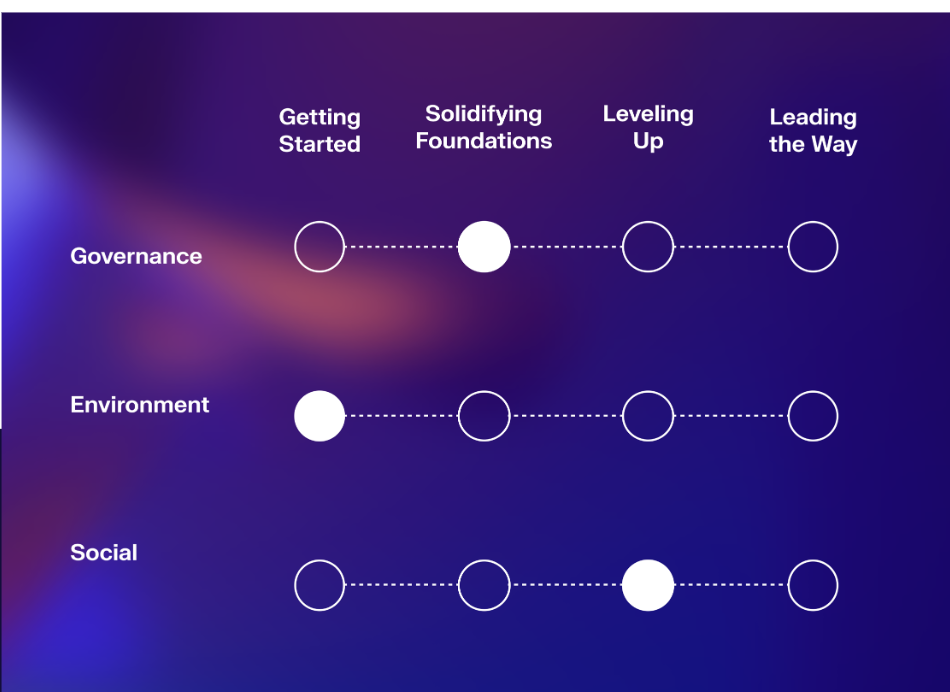Salesforce co-CEO Marc Benioff has been preaching for years about the importance of corporate social responsibility, the idea that companies need to worry about not only making money for investors but also contributing positively to the wider community in which they operate.
He could be onto something. Increasingly, consumers and some investors want to do business with companies that at least try to do the right thing.
In fact, a term has developed in recent years around a set of corporate initiatives to run business with an eye toward broader social responsibility. ESG, or environmental, social and governance, is an umbrella term that developed around this set of goals, which can include community outreach, DEI efforts, thoughtful leadership, environmentally friendly policies like a net-zero emissions goal, and running your business in an ethical and responsible way, among other things.
While it’s typically applied as a filter for investors, businesses have also adopted the term as a kind of organizational moral compass and a set of principles to try and live up to as part of their values system.
As this notion begins to take shape, CNBC reported that there is already a backlash against the concept among some Fortune 500 executives who are upset about reporting requirements.
Last year, Frank Slootman, CEO at Snowflake, ruffled some feathers when he told Bloomberg TV, “We’re actually highly sympathetic to diversity but we just don’t want that to override merit. If I start doing that, I start compromising the company’s mission literally.” He went on to say that other CEOs agree but won’t say so publicly. While he later walked back those comments a bit, the CNBC report suggests that ESG is under attack more broadly from both executives and from some Republican politicians.
What’s more, a Harris Poll of 1,491 executives across 16 countries conducted on behalf of Google found that executives may not always be truthful about ESG efforts. In fact, 58% of respondents believed that “green hypocrisy exists and their organization has overstated their sustainability efforts,” according to a report from Google.
But these executives could be out of touch with consumer and investment sentiment. A Harvard Business School blog post by Tim Stobierski lists 15 findings from various surveys that might turn the heads of business leaders who question the value of ESG efforts.
Consider that he writes that “70% of Americans believe it’s either ‘somewhat’ or ‘very important’ for companies to make the world a better place,” and 41% “of millennial investors put a significant amount of effort into understanding a company’s CSR (corporate social responsibility) practices, compared to just 27% of Gen X and 16% of baby boomers.”
TechCrunch spoke to leaders from three companies — Plume, Beamery and Acquia — to get their views on ESG and why they are passionate about working at a place that cares about the world as much as making money for shareholders. (Plume and Beamery are late-stage startups, while Acquia was late stage when it was acquired by Vista Equity Partners in 2019.)
Working for something bigger
It’s interesting to note that of the three companies we spoke to, two have legal pros in charge of ESG and one tasks its CISO with managing such initiatives. It may not be what you expected, but each has reasons for this. One thing that was clear in our conversation was that these folks were interested in this work precisely because they wanted to do something more meaningful with their careers.
Xavier Langlois, chief legal and impact officer at Beamery, a talent lifecycle platform that has raised over $170 million, said one of the primary reasons he joined the company was that he wanted to be part of an organization that was serious about being socially responsible — and to have a higher purpose than simply making money for investors.
“Prior to joining Beamery, when I was in private equity, I realized that my sole job was making rich people richer, and it was soul crushing. And that was a big part of the reason why I joined an impact company like Beamery. I realized that there’s more to the world than making money, and I wanted to do some good,” he said.
Beamery raises $138M at an $800M valuation for its ‘operating system for recruitment’
Shari Piré, chief legal and sustainability officer at Plume, which has raised almost $750 million building smart WiFi equipment, said she took a similar path to Langlois: She wanted to use her background in law and data integrity to help a company measure how well they were doing with their ESG goals.
“I wanted to both leverage my background in data integrity, really accurately documenting, in this case, our ESG goals, and then reporting against them, but also finding a company that wanted to do good and would support me, so I didn’t come just as legal,” she said. Piré joined Plume because she said that the CEO embraced her desire to leverage economic, social and environmental sustainability initiatives.
Robert Former, CISO/VP of security at Acquia, came at ESG a bit differently. While he took the job because he was impressed with its DEI efforts, it was prior to formalizing any ESG initiatives. Those arrived later, but he was eager to help and volunteered to run the program.
“One day the CEO called together all the executive leadership [ … ] and said, ‘Hey, we need to formalize our ESG here. Who’s interested? Who’s got a background in this?’ And because I have a background in environmentalism, just growing up, it got my attention and I raised my hand,” he said.
What are these programs about?
Clearly, these executives joined these companies because of the opportunity to do something positive, but what exactly are they doing? It’s one thing to talk about social responsibility; it’s another to deliver on it.
The companies are taking so many different approaches to meeting ESG goals that it would be impossible to list them all, but we will provide some examples of what each is doing.
At 1,400 employees, Acquia is the largest of the three organizations we spoke to. It’s also owned by private equity firm Vista Equity Partners, which brings its own ESG goals to the table for all its portfolio companies. As part of that, Acquia has a website where it lists its goals in detail.
For instance, it plans to be 50% carbon neutral by 2030 and 100% by 2050. It has helped plant 10,000 trees, which helped capture 500 tons of carbon dioxide, according to the site.
Drupal’s journey from dorm-room project to billion-dollar exit
Meanwhile, Beamery, with 400 employees, is working toward a more inclusive and diverse workplace and pledges to reduce homogeneity to 40% across all departments and seniority levels by 2028. It has publicly stated all of its goals and progress so far on its impact and sustainability manifesto website.
It’s also committed to cutting its carbon emissions by half by 2028.
At 550 employees, Plume is not huge, but it’s still looking to have a positive impact across all dimensions of ESG, part of which is doing good work in the broader community to make use of the technology it creates.
“We’re currently connected to roughly 1.8 billion devices. And so we have a lot of data, and one of the ways we can do good in the world is through digital equality. And so we’re bringing WiFi to underserved communities,” Piré said.
As part of those efforts, the company reports bringing WiFi to low-income communities and to Ukrainian refugee camps, where 100,000 people were given free access to WiFi. While it did not provide a specific timing goal for carbon reduction, it said that it is in the process of reviewing its emissions and how it can cut usage.
“We are currently evaluating which aspects of our operations contribute to our emissions and where and how a plan to reduce our emissions may be most impactful,” Piré said. Plume also publishes its sustainability policies online.
Plume raises $300M as it passes 1.2B devices in 35M homes using its smart Wi-Fi service
Tools and measurements
It’s well and good to talk about wanting to do good in the world, but as the CNBC report and the Google survey showed, that’s all some people do. They try to make themselves look good publicly while behaving differently behind the scenes.
The companies we spoke to have third-party partners who are working with them to measure progress toward their goals.
Plume reports it will use the Greenhouse Gas protocol as a baseline to measure its carbon footprint and then start using a Life Cycle Assessment (LCA) dashboard like Ecoinvent to monitor its carbon usage in real time, according to the company. It’s tracking compliance training in Docebo, a learning management system and also using manual methods like Excel spreadsheets to track progress across various goals.
Beamery works with Fair HQ and B Corp. The former helps measure the success of its DEI efforts, while the latter is a certification that looks at a company’s impact on the planet, people and community. They are currently working toward accreditation with the group.
In what looks like an honest assessment of its progress on each of the ESG dimensions, Beamery admittedly has work to do, but it’s improving on each dimension.

Acquia works with a tool called Greenstone that asks a bunch of questions and then provides an ESG score based on the answers. Former said he sees it as less about the score and more about improving over time.
“We are a portfolio company of Vista Equity Partners, and Vista has actually been driving very strongly on ESG throughout their portfolio companies. So they brought in a tool called Greenstone, and you put your data in, and then it gives you a score,” he said.
But he pointed out that the score can’t measure everything: “Data is important, but it is not everything. How do you measure the soul of a company?”
What he means is that ESG is important, but there has to be honest intent behind it. If companies are simply virtue signaling to make themselves look good to investors and consumers, while privately rejecting the spirit of the idea, they aren’t committed to the ideals behind the concept.
But there are companies that seem to be all-in when it comes to helping the world by improving the environment, building diverse and inclusive workplaces, working in the community and contributing to the common good, all while providing ways to be transparent about what they are doing — and it’s hard not to like that.































Comment